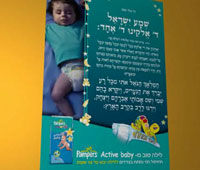Pampers in the orthodox sector
One quarter of children born in Israel is from an Orthodox Jewish family. Pampers' shares in this important segment were extremely low. The brand decided to face the challenge of rebuilding Pampers' equity in this segment and regenerate trial.
Pampers was challenged with how to reach Orthodox Jews given the fact that they are not allowed to work on Saturdays. These families are restricted from turning on the light, lighting the oven, and even unfastening tapes on the side of diapers. Thus, along with many other tasks in preparation for the holy day, Orthodox mothers have to prepare enough diapers on Friday.
Huggies had created a new kosher diaper, with a different fastening system, which did not fall under the definition of work, meaning Orthodox mothers could use them normally on Saturdays.
Convenience meets with approval
Naturally, Orthodox mothers liked the convenience of this tailored product. Contrary to Huggies being manufactured in Israel making this customisation possible, Pampers was manufactured outside the country.

Orthodox Jewish mothers found Pampers to be irrelevant to them. The brand nearly had to force them to talk about it and when they did, they described it as "secular" and "foreign."
Furthermore, Orthodox Jews do not watch television or use internet making Orthodox families even more difficult to reach. On top of this, the sector also had limitations on communicating specific topics with the target group relating to pregnancy and births even in the limited existing media. As a result, these mothers suffered from a lack of information.
Pampers identified first-time mothers as agents of change partly because this group had not yet established brand preference. Moreover, these mothers were openly expressing their need for more relevant and accessible parenting information challenging the existing segment norms.
Going a step further
Pampers decided to go beyond simply targeting Orthodox mothers, and enlisted the help of key influencers who would talk to them about this sensitive subject, thereby encouraging a more open dialogue. In this way, Pampers positioned itself as the expert baby care brand.
Pampers launched the first ever weekly radio baby care show featuring experts and a call-in service giving Orthodox mothers a forum to ask questions and share experiences.
Ongoing branded print advertorials in Orthodox women's magazines were designed with easy tear-off sections to avoid embarrassment by exposure to "irrelevant" parities like children and husbands.
The brand partnered with recovery homes where Orthodox mothers recuperate after having their baby, and carried the baby through to the Point of Birth ensuring Pampers was the diaper of choice in the main post-natal recovery homes. Weekly lectures by Pampers experts were organised where mothers were offered First Time Mother Kits (samples, coupons, development booklets specifically adapted to the sector).
Results
Pampers' shares in the Orthodox sector have grown my more than 50% YOY. Shares in the key Orthodox Supermarket chains grew from 2% to 25%.
According to an annual equity measurement (Multi Brand Tracking Study), Pampers' overall rating amongst Orthodox consumers grew by 10 points while Huggies stayed flat.
This campaign was shortlisted in the 2011 Festival of Media Awards in the 'Awards for Media Bravery' category.
Source: Cream: Inspiring Innovation
Cream is a curated, global case study gallery of excellence, providing the marketing community with the latest trends and inspiration to help grow their business.
Go to: http://www.creamglobal.com







